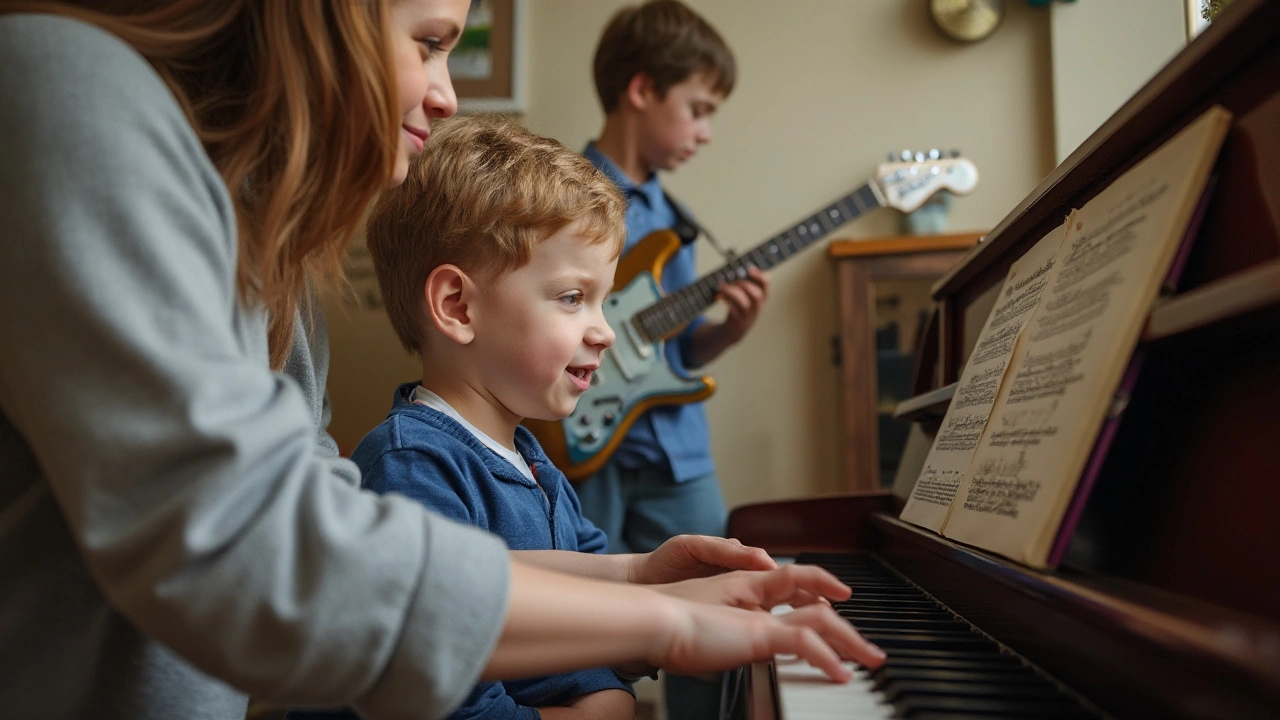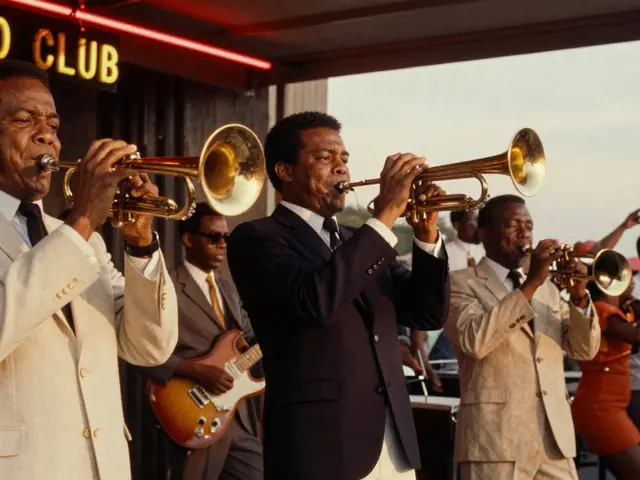Deciding whether to learn the piano or the guitar first can be a challenging choice for many beginners. Both instruments are immensely popular, but each has its unique qualities and benefits. It's essential to consider ease of learning, versatility, physical and cognitive benefits, and practical aspects before making a decision.
- Ease of Learning
- Versatility and Musical Styles
- Physical and Cognitive Benefits
- Practical Considerations
Ease of Learning
When starting your musical journey, understanding the ease of learning either the piano or the guitar is essential. Let's dive into what makes each instrument beginner-friendly and where you might find challenges.
The piano is often praised for its straightforward layout. The keys are in a linear format, making it easier for beginners to visualize scales, chords, and progressions. Unlike the guitar, you won’t need to tune your piano every time you practice. Standard notation for the piano is also more intuitive; notes correspond directly to the keys you press. This makes it simpler for beginners to read music and understand the correlation between written notes and played sounds.
The guitar, on the other hand, has its own set of pros. One of its prime attractions is its portability. You can carry it around and practice anywhere, unlike a piano which is typically stationary. Basic chords on the guitar can be quite easy to learn. With just a few finger positions, you can play many popular songs, giving beginners a sense of accomplishment early on. However, learning guitar also involves grappling with finger pain initially, as you build up calluses. Tuning can be tricky for novices too, as it requires a good ear or a reliable tuner.
According to guitarist John Williams, “The guitar is an incredibly approachable instrument. You can play simple melodies and chords within a few days, giving you the motivation to keep learning.”
Another critical point is that pianos teach music theory more effectively. Since the piano’s layout visually represents theory elements, such as intervals and chord structures, beginners can gain a stronger foundational understanding. Guitarists might need to learn different positions and shapes for the same chord, which can be confusing at first. For young children, a piano might be more suitable as it does not require as much finger strength and dexterity as the guitar does.
If we look at a few statistics, surveys often show that beginners find the piano easier to start with. In one survey of music teachers, 70% recommended piano as the initial instrument for young learners due to its simplicity and educational value. This doesn’t mean the guitar isn’t a good starting point, but it showcases the general consensus on the piano's user-friendly nature for beginners.
Ultimately, the ease of learning is subjective and depends on what aspects you find more comfortable initially. Some might appreciate the visual clarity of a piano, while others may enjoy the guitar's early wins with simpler songs. Understanding these pros and cons will help you make an informed decision and set you up for a gratifying musical journey.

Versatility and Musical Styles
When evaluating the guitar and piano based on versatility and musical styles, each instrument shines in its unique way. The guitar is a staple in many genres, from rock and blues to jazz and folk. Its portability and ability to produce different sound textures make it a favorite among songwriters and bands. Acoustic, electric, and classical guitars each offer distinctive sounds, and this diversity allows guitarists to experiment with different styles.
On the other hand, the piano is often considered the backbone of music education, primarily due to its comprehensive musical range and ability to play both melody and harmony simultaneously. From classical pieces by Beethoven to contemporary pop songs, the piano fits seamlessly into nearly any genre. It is a key instrument in orchestras, jazz bands, and as a solo instrument in countless musical pieces.
One significant advantage of the piano is its visual layout. The linear arrangement of keys can make it easier to understand music theory concepts like scales, chords, and intervals. This visual aid can be particularly beneficial for beginners trying to grasp the basics of music. Additionally, the piano has been a crucial tool in composing and dissecting music, which is why many professional musicians recommend starting with it.
Influence on Different Genres
Rock and blues heavily rely on the guitar, with iconic solos and riffs becoming the defining features of many songs. Think of legends like Jimi Hendrix and Eric Clapton, whose mastery of the guitar shaped musical history. The instrument’s ability to produce a variety of tones through amplifiers and effect pedals adds another layer of versatility. The piano also has a profound influence across genres. It's the core of classical music and widely used in jazz, pop, and even electronic music. Pianists like Ray Charles and Elton John have shown how the piano can be central to a band's sound, bringing both rhythm and melodic leads.
"The piano is able to communicate the subtlest universal truths by means of wood, metal and vibrating air." - Kenneth Miller
Each instrument offers a different experience for both the player and the listener. The guitar’s tactile feedback - bending strings, strumming, and fingerpicking - provides a physical interaction that many musicians find incredibly rewarding. The piano, with its dynamic range and expressive potential, allows for nuanced performances that can convey deep emotional landscapes, making it versatile for solo and ensemble settings.
Key Learning Opportunities
Starting with the guitar can teach essential skills like finger independence and strumming patterns, which are transferable to other string instruments. For aspiring musicians interested in joining bands or playing contemporary music, the guitar often provides a quicker path to playing recognizable songs. Piano beginners, however, benefit from learning both treble and bass clefs, which offers a more holistic understanding of music notation. This foundation is incredibly beneficial for those wanting to pursue deeper musical studies or compose their own pieces.

Physical and Cognitive Benefits
Playing musical instruments like the piano and guitar offers numerous physical and mental advantages. For instance, piano playing requires the use of both hands simultaneously in different ways, which is known to enhance hand-eye coordination and fine motor skills. This bilateral coordination can translate into improved dexterity in other areas of life. Additionally, research has shown that children who play the piano often demonstrate better problem-solving skills and higher IQ scores.
On the other hand, the guitar demands agility and flexibility, especially in the fingers and wrists. Holding down the strings and forming chords requires precise and consistent finger strength. Regular practice can lead to improved muscle memory and tactile feedback. Studies indicate that musicians, including guitarists, tend to have better memory and faster response times compared to non-musicians.
Beyond the physical aspects, learning an instrument like the piano or guitar significantly impacts the brain. Playing music engages various parts of the brain, including areas responsible for emotion, memory, and auditory processing. MRI scans have highlighted that musicians have more gray matter in regions involved in these functions. The repeated practice of learning and perfecting pieces fosters neural plasticity, making it easier for the brain to adapt to new challenges.
"Music can change the brain, and for the better," says Dr. Gottfried Schlaug, a neurologist at Harvard Medical School, emphasizing how playing instruments can create new neural connections and boost cognitive functions.
Moreover, both instruments can reduce stress and promote emotional well-being. Playing your favorite pieces can be a form of expressive therapy, providing an outlet for emotions and improving mental health. Musicians often report feeling more relaxed and happier after playing. This emotional connection to music acts as a great motivator for consistent practice, enhancing both physical and cognitive skills over time.
Memory and Learning
Learning to play the piano or guitar also boosts memory and learning skills. Memorizing music pieces requires sharp recall abilities and attention to detail. This practice strengthens the hippocampus, the part of the brain associated with memory and learning. Musicians tend to have better auditory memory, allowing them to pick up new languages and retain information more effectively.

Practical Considerations
When it comes to choosing between the piano and guitar as your first instrument, practical factors play a big role. One of the most important aspects to consider is the cost and space requirements. A decent quality keyboard or digital piano can be relatively affordable, starting at around a few hundred dollars. On the other hand, a good beginner guitar can cost even less, sometimes under $100, making it accessible for almost anyone.
Space is another crucial practical factor. Pianos, especially acoustic ones, are large and can take up a significant portion of your living area. Even digital pianos, while more compact, require dedicated space. Guitars, however, are incredibly portable. You can store them in a corner of your room or even hang them on a wall.
Consider the maintenance aspect as well. Acoustic pianos need regular tuning by a professional, an additional recurring cost that can add up over time. Digital pianos require less maintenance but can still need occasional servicing. Guitars also require occasional care, like string changes and adjustments, but these tasks are often simpler and less costly to perform yourself.
"A big challenge for many beginners is finding the time to practice," says Dr. Susan Hallam, an expert in music psychology. "The guitar’s portability means that it can fit into more people’s lives more easily."
Practicality also extends to learning resources. There are abundant resources for both instruments, but the way you learn can differ. Piano lessons often require a more formal approach with a teacher, especially in the beginning stages. On the flip side, countless online tutorials and lessons can guide you through the basics of the guitar without needing formal lessons initially.
Another consideration is the noise level. Practicing the piano, especially on an acoustic one, can be quite loud, which might be a concern if you live in an apartment or have close neighbors. Digital pianos and keyboards offer the advantage of a headphone jack, allowing for silent practice. Electric guitars also offer this benefit, though acoustic guitars are inherently louder.
Transportation and durability are also practical considerations. If you need to transport your instrument frequently, an acoustic piano is clearly impractical. Digital pianos and keyboards are more portable, but still, nothing beats the ease of carrying a guitar. Guitars are generally durable but can be susceptible to changes in humidity and temperature, requiring some care to maintain their condition.






